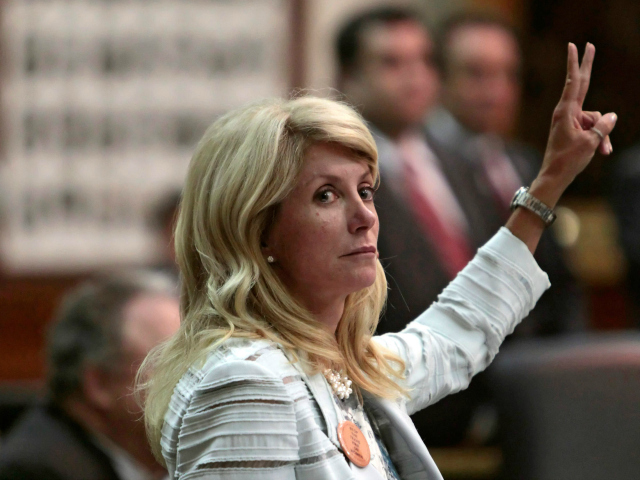
The badly timed New York Times Magazine profile of Texas Democratic gubernatorial candidate Wendy Davis may have called her biographical falsehoods “politically exquisite,” but to the public editor of the newspaper, it was not enough to prevent the piece from being sexist.
Public Editor Margaret Sullivan wrote a reply this weekend to criticism of the extensive feature on Davis, which acknowledges her lies while also praising her for them and attempts to spin them into a flattering portrait of the candidate. To Sullivan, the end result was not flattering in the least.
Sullivan’s column concerned both the New York Times Magazine cover on “Planet Hillary” (which she described as “simply bizarre”) and the profile of Davis, which she was inclined to see as closer to sexist than merely strange. She began her analysis with the caveat that she is not entirely sure if it is possible to write about the life of a female politician without avoiding a mildly offensive tone about a woman’s ability to have a career: “When an article sets out to examine gender bias, how can it avoid perpetuating that bias along the way?” She calls author Robert Draper’s piece “well-intentioned” but ultimately concludes that it furthers the narrative that Davis lied about being a good mother and continues to push stereotypes about women in politics.
It was not just the text of the piece but the presentation to which Sullivan took offense. The “outdated” headline (“Can Wendy Davis Have It All?”) and the subheadline accusing Davis of “political mythmaking,” Sullivan argues, suggest that “Ms. Davis is spinning a big lie.” In corroborating the fact that Davis’s backstory is in large part a myth, Sullivan argues Draper is “splitting hairs.” She concludes that she hopes the failings of both the Clinton and Davis profiles will teach future writers of profiles where the pitfalls are located and how to avoid them.
Sullivan gives Draper a chance to respond, and he does indeed point out that much of the criticism he has received has come from the right, who viewed his flattery of her campaign (and even of her proven lies) as simply that: flattery. He added that he felt “duty-bound” to note the mistakes she had made in telling her story as a journalist and left it at that, while also being “acutely conscious” of the difficulties of writing about gender politics. Draper responded online, as well, joking that Sullivan had found him “guilty of being a sexist dipshit,” but immediately defended himself in the next tweet: “Or possibly guilty of committing an act of journalism – in this case examining a campaign’s admittedly inaccurate narrative. I’m OK with it.” Draper also replied on Facebook, his response posted in part to The Nation:
I think when a politician calculatedly runs on his/her life story & the representation of that story proves to be inaccurate, reporters are required to examine that story in detail, else they become complicit in the narrative-shading.
Draper’s account did indeed acknowledge that Davis has propagated misstatements about the way she ran her life. It also praised those falsehoods for how keenly they would have been able to garner support if they were true, and the piece ultimately does little to promote the idea that Davis has time and again proven to be untrustworthy. There, too, the limits of gender politics betray Draper: Davis’s inconsistencies run the gamut from her support of gun rights to outright being a Republican, and most of them have little obvious place in a story about a spunky woman running for a top office.

COMMENTS
Please let us know if you're having issues with commenting.